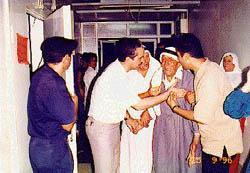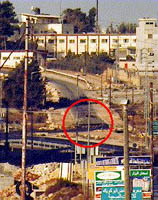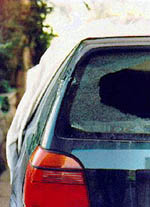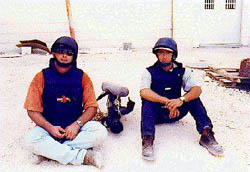
Left: The loss of life had touched everyone. Here, Yasser Abdul Ghani's distraught father is comforted by relatives and friends. Photo by Saleem Daoud.
Israel would later announce that all Palestinian Police who had opened fire on Israeli soldiers were 'wanted'. One has to conclude that the only fair thing to do would be to issue a similar response. What about the use of live ammunition by Israeli soldiers on unarmed civillians? Is this somehow not a crime?
Public Relations photographer Yasser Darweesh told of how Israeli soldiers danced and congratulated each other when they shot people on the first day, slapping palms with each other, and saying "Good shot, you got him in the head." When I asked Yasser why he hadn't photographed this, he told me, "I couldn't believe what I was seeing. I was so shocked I didn't think to."
Reports from a PBC journalist I know called Mohammed confirmed exactly this. Injured in a car accident during the clashes, he told me from his hospital in a voice of disbelief, "They were dancing! They were laughing! I couldn't believe I was seeing it!"
"I will never forget what I saw on that day," Yasser added, "Never."

Right: Highlighted, an Israeli armoured personnel carrier at the edge of Zones "A" and "C" with the joint Israeli-Palestinian District Commanding Office in the background, a few hundred metres from the center of Ramallah. Just behind the DCO is Beit El settlement. Photo by Kifah al-Fani.
Some settlers allegedy came barreling into the middle of Ramallah to "show the Arab's what's what". One look at Palestinian police with AK-47s apparently made them reconsider and they left in a hurry.
When these armoured vehicles turned up it reinforced what the Palestinians have known all along - they were under seige in their own country. A number of reports, yet unconfirmed, say that Netanyahu told Arafat he would "shell Palestinian towns and cities" if Arafat did not get his troops to stop shooting.
Wow, it's getting just like Lebanon here in yuppie Ramallah. Bombing civilian populations to try to get them to fight those from their own country, when those people are fighting the people who have occupied their own country. That makes sense. Not.

Left: No one was unaffected by the week's war. Yuppies ("Kit Kats" in the Ramallah vernicular, a reference to those who buy imported chocolate) who parked their cars in the wrong place had the windows shot out. Photo by Nigel Parry
Live ammunition of course. The holes were clearly bullet holes from the damage they did to the bodywork.
The slaughter was broadcast continually on the Palestinian television news channels. This was a first, as during previous periods of intense conflict there had been no Palestinian-controlled television. It made everyone an eye witness and it ensured that everyone was involved.
As the conflict went on, Arafat was to order television stations to stop broadcasting scenes from the clashes. Much of the broadcasts were very editorialised, with images of the Israeli violence backed by music from the Palestinian revolution in exile andfrom the Intifada.

Right: It was unquestionably a war, the ironic title of the directory we made on the Birzeit webserver to hold the initial version of this September 1996 photodiary. Photo by Saleem Daoud.
Check out these two guys. They are journalists. Bullet proof vests and helmets have been added to their usual clobber of cameras and sound equipment.
This spoke a loud word about the nature of the assault on the Palestinian demonstrators they were filming.